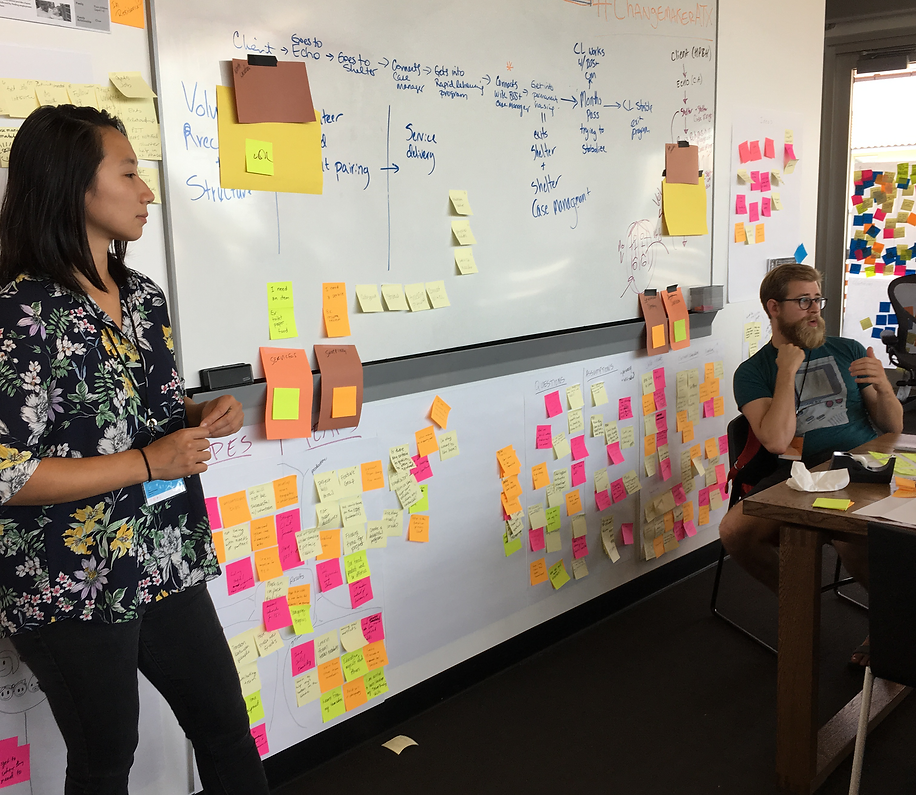top of page
Changemaker Series

Details
Category
Research-driven UX Design
Time Frame
May–September 2018
Role
UX Designer
Researcher
What was the AIGA Austin Changemaker Series?
The AIGA Austin Changemaker Series united teams of creative professionals with nonprofits and social change organizations to use design thinking, sustainable frameworks, and creative tools to help advance their mission.
The design tools and sustainable frameworks that creative professionals use daily can have a large impact when applied toward aiding important social challenges.
Each year, the series rallies around a new cause from May to September and assisting nonprofits fighting homelessness was selected in 2018.
Business Problem
How might we provide volunteer services to our (Foundation for the Homeless) client families while respecting their confidentiality?
The transition period to self-sufficiency is emotionally taxing. Case managers help clients map goals, create an action plan, and a housing stability assessment. A lack of resources and communication leads to a high rate of recidivism.
Design Process
Research Actions
Outcomes, Assumptions, Hypotheses — Collaborative Design — Document MVP — Research & Learning
Process Overview
Our first meeting with the non-profit organization, Foundation for the Homeless, kicked off an extensive data-gathering phase. We dove into conducting interviews, analyzing secondary research, and pinpointing opportunities to help the organization meet its goals. We focused on the Foundation's main mission: to offer a safe and supportive shelter for homeless families and guide them toward securing their own affordable housing.
Documenting Research
User experience design thinking exercises with the AIGA "Team Star" and representatives from an
assigned non-profit.

Design Thinking: Team Star and nonprofit The Foundation for the Homeless
Persona

Customer Journey Map
We used storytelling to visually map user goals and actions as a workflow to identify opportunities.
During our initial meetings with the Foundation For The Homeless, the team rapidly learned and documented as much as possible.

“As more volunteers join the organization, they tend to become donors. Donors share in the work and mission of the organization, making their volunteer experiences more meaningful.”
– Andrew Willard, Program Manager

User Experience Design
Prioritization Grid
Team collaboration helped us to evaluate, prioritize ideas, and to focus our conversations.

Ideation
Organized, thoughtful research and productive team discussions led to robust ideation. The team generated far too many solutions. We trimmed down the list and broke up into smaller groups to begin planning how to execute the remaining potential solutions.
A Potential Solution
In my opinion, the strongest concept our team generated was that of a virtual mentor.

Findings
Client Family Needs Can Be Very Demanding and Diverse.
Stress, limited time, and resources lead case managers to an unsustainable approach. Foundation for the Homeless organization is lacking childcare facilities, employment assistance, current technology, and parenting classes.
Human Solution
Virtual Mentorship Program

Learnings
To run a successful volunteer program, it's key to have a dedicated staff member managing things full-time. Case Managers play a crucial role too – they need a solid vision of what success looks like, which will really help when it comes to choosing the right volunteers. And, of course, being clear and upfront about expectations is key, both for the volunteers and the families we're helping. This way, everyone knows what's needed and can work together effectively.
Additional Notes & Recommendations
We considered putting together a volunteer brief template for FFH to make everything more streamlined. This template may have covered some essentials: what the clients need, their goals, what they expect, and the hurdles they might face.
Also, using free sites like Idealist or Craigslist could be great for getting the word out and keeping track of our volunteer spots. In order to stay organize meetings and making sure everyone's on the same page, scheduling tools like Doodle and Google Calendar could be effective. It's all about making volunteer coordination smoother and more efficient.
bottom of page
